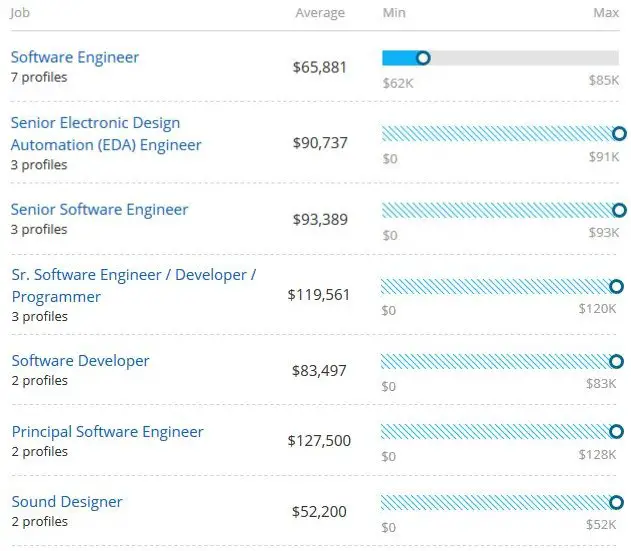How to become a Software Engineer
This article provides in-depth information into What is a Software Engineer? What Software Engineers do? Degrees for Software Engineers, Steps to become Software Engineer and much more.
Computer software engineers apply the principles and techniques of computer science, engineering, and mathematical analysis to the design, development, testing, and evaluation of the software and the systems that enable computers to perform their many applications.
Everything you need for becoming a software engineer is listed below,
- Gain a Bachelor's degree
- Gain experience through internships
- Land on an entry-level job
- Consider graduate degree
- Become Certified
|
Career Title |
Software engineer |
|
Degree Requirements |
Bachelor’s degree in Software engineering |
|
Job Growth (2018- 2028) |
21% |
|
Experience required |
1 year |
|
Salary (2020) |
$106,816 |
|
How long to become a Software engineer |
4 years |
|
Required Skills |
Interpersonal, Leadership, Communication, Computer skills, problem-solving |
What does a Software Engineer do ?
A software engineer is a person who designs an original piece of software or improves an existing piece by finding ways to make it better in quality, price, or running speed.
-
Gather requirements for the software from the customer.
-
Give inputs and feedbacks for the existing software.
-
Build different software modules and integrate them.
-
Ensure all the components of the software are in sync with each other.
-
Testing all modules of software to ensure proper functioning of the software under various conditions.
-
Making standard documentation of software to help other engineers to understand the functionality
-
Work as a team with other software engineers to achieve a common goal.
Steps for becoming a Software Engineer
1
Earn A Bachelor’s Degree
Bachelor’s degree is the minimum requirement to become a software engineer. A bachelor’s degree in computer science or related field with emphasis on mathematics and programming language can also help a student land a job as a software engineer.

2
Get An Internship
Doing an internship during the bachelor's program is an excellent way to gain real-world training and network with potential employers. Internships are usually of three to six months and student works on projects.

3
Get An Entry-Level Job
After completing the Bachelor’s degree get an entry-level job at a tech firm. The demand for software engineers is continuously growing and getting an entry-level job will be easy. After gaining experience you can either decide to pursue a master’s degree or look for better opportunities.

4
Earn A Master’s Degree
A Master’s degree is suitable for those who want to advance their career. A master’s degree in software engineering opens a new opportunity for students and qualifies them for leadership and management positions.

5
Get Certified
In the field of software engineering skills are valued the most. Software engineering is precise and technical, and gaining certification verifies an applicant’s knowledge and abilities. A combination of experience and certification will increase a candidate’s marketability.

Software Engineer Degree Levels
Associate
An associate degree in software engineering takes around two years to finish. The associate degree can be a valuable path for understudies who need a degree to take on an entry level software engineering position without investing the energy and cash getting a four-year degree. To sweeten the deal even further, some associate degrees can fill in as stepping stones to getting a four-year college education later on.
Database management systems
-
Commonly used DBMS
-
Relational and object-oriented databases
-
Data mining
Objectives
-
Learn how database management systems work
-
How to design and create a database
-
How to implement systems within an organization
Operating systems
-
OS Programming Languages
-
Computer Architecture
-
File management techniques
Objectives
-
To understand Foundational concepts
-
Fundamental principles of operating system design and operation
-
Interactions among the various components
Networking
-
Network security protocols
-
Types of networks
-
Network design considerations
Objectives
-
To understand basic principles of networks
-
Role software in their functionality and application
-
Defining Protocols
Bachelors
Software engineering gives students the best chance of finding ideal employment, the bachelor’s in software engineering is worth pursuing. In fact, most entry-level software engineering positions will require this four-year degree. Some more advanced positions may require a master’s degree in software engineering. In that case, a bachelor’s degree could be a prerequisite to admission. In this course, students develop a comprehensive understanding of programming, software architecture, and software testing. They may also take specialized courses in application areas, such as networking or embedded systems.
Object-oriented software development
-
Computer programming expressions
-
Programming logic
-
Understanding how fields and methods work
Objectives
-
Learn advanced programming language
-
Design patterns
-
Frameworks and toolkits
Computer security
-
Disaster and data loss recovery
-
User access methods
-
Fundamentals of cryptography
Objectives
-
An overview of computer security
-
Ethical, legal and practical considerations
-
Fundamental notions of threat, vulnerability, attack, and countermeasure
Project management
-
Understanding project lifecycles
-
Project planning
-
Risk management
Objectives
-
Techniques and methods for designing and developing software projects
-
Completing the project on schedule and on budget
-
Software development life cycle (SDLC)
Masters
A master’s degree in software engineering takes around two years to finish. Many programs are designed for students who are working full-time. The master’s degree not only provides additional knowledge of the software engineering field but also offers education in management and leadership, so that graduates can take on more complex projects, be able to successfully coordinate those projects and work well with a team.
Mathematical modeling
-
Quantification of variables
-
Applying models to real-world problems
-
Identification of models
Objectives
-
Introduction to mathematical models
-
Understanding and predicting natural phenomenon and human nature
-
Create mathematical models
Software design
-
Object-oriented programming
-
Designing programs
-
Analysis of codes
Objectives
-
To examine different programming languages
-
characteristics of software creation
-
Classical and evolving software engineering methods
Software testing
-
How to troubleshoot
-
Methods of debugging
-
Analyzing and interpreting test results
Objectives
-
Tools and techniques for practical testing of software
-
Analyzing theoretical testing models
-
Test Administration
Doctorate
While Ph.D. programs in software engineering do exist, they are far less common than the bachelor’s or master’s degree. Usually taking at least four years to complete, Ph.D. software engineering degrees are often research-oriented, culminating with a dissertation. In addition, students will take focused classes on very specific areas of software engineering, such as robotics, distributed systems, software security and quantitative research methods. A Ph.D. is usually necessary for those who desire a career in research or academia, such as teaching at a college or university.
Software modeling and design
-
Identification of design concepts
-
Unified Modeling Language
-
object-oriented software architectures
Objectives
-
Principles for developing large scale software systems
-
Development of quality software
-
Modeling of software elements
Economics of software engineering
-
Quantitative modeling of software lifecycle
-
Cost-benefit analysis
-
software evaluation metrics
Objectives
-
Designing and managing software
-
Performance Models & Cost-Effective Models
-
Minimum Available Budget
Software engineering for the internet
-
Interactive web application
-
Client-server programming methods
-
Understanding middleware
Objectives
-
Effective web-based software and applications
-
Security risks
-
Opportunity for wide-area distributed computing
Certificate
Professional certifications in software engineering establish an individual’s qualifications within the field. Certifications demonstrate a conceptual understanding and technical expertise in specific areas of the profession.
C++ Certification
- Object-Oriented Programming
-
Classes
-
Operator overloading
Objectives
-
Complex C/C++ programming techniques
-
Mastering C++ programming
-
Object-oriented approach and its vocabulary
IEEE Professional Software Developer Certification
-
Detailed Design
-
Implementation
-
Testing
Objectives
-
Knowledge of software engineering requirements
-
Design, construction, and testing of Software
Microsoft Certified Solutions Developer (MCSD)
-
Programming tools
-
Software-engineering issues
-
Concurrency
Objectives
-
To understand development tools
-
Application lifecycle management
-
Universal Windows Platform
Software engineer’s salary
A Software engineer working in the United states can earn an average salary of $68,902 annually as determined by the Bureau of Labour Statistics 2020. The salary typically ranges between $61,272 and $76,025 and this vastly depends on factors such as education, certification, amount of experience and additional skills that enhance your profile.
Job growth
According to the Bureau of Labour Statistics 2020, the employment opportunities for a software engineer is projected to grow about 21 percent over the period of 2018 to 2028 which is faster than the average growth of a job. With the booming information technology and computer software, the field opens more offers to potential engineers.
| Minumum Credit Score | Apply in as little as | Variable APR | Fixed APR | ||
|---|---|---|---|---|---|
 | Not Available | 15 minutes or less | 2.95 | 4.74 | View disclosures |
 | 620 | 2 minutes | 5.38%-16.99%1 | 4.43%-16.99%1 | View disclosures |
 | Not Available | 15 minutes | 1.13% - 11.23%¹ (with autopay) | 3.50% - 12.60%¹ (with autopay) | View disclosures |
